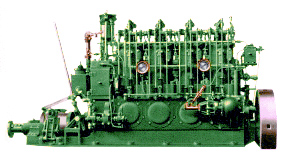No doubt about it, the marine diesel engine is a lot more efficient and practical than the engine envisioned by Rudolph Diesel in 1892 when he filed for a patent for his first engine at Germany’s Imperial Patent Office.
Today’s diesels are smaller, more fuel-efficient and burn cleaner, but they aren’t as versatile as some earlier 20th-century diesels. Imagine this, you’re ending a really long trip. Nothing’s gone right, what with breakdowns, few fish and the guy overseeing the filling of the fuel tanks before you left port was a bit drunk from the night before and thinking only about the wonderful time he had. So, all the tanks weren’t filled and now you’re a couple hundred miles from the nearest port — it’s blowing 80 with 30-foot seas — and you’ve just run out of fuel. It doesn’t help that the wind is setting you down on a lee shore.
Minus refined diesel fuel, your engines are silent and useless. But if it was 1930 instead of 2013, the diesels might still be operating and you wouldn’t be in a sweat.
In the January 1930 edition of Atlantic Fisherman there’s an ad for an engine company that tells the story of Capt. C.T. Pederson. Pederson was with the Northern Whaling and Trading Co., and was doing a little whaling east of the Mackenzie River, which would put him in the Beaufort Sea.
Westerly gales had “slammed the ice pack in on the coast… We found our way blocked,” Pederson recounted. It took five days to blast and buck their way free. In doing so, “We burned up so much fuel, without making any headway, we naturally ran short of diesel oil.”
But not to fear, for that engine, an Atlas Imperial, ran on more than just diesel fuel. Into the fuel tank was dumped “the cook’s savings of pork grease, rotten whale oil, remainder of diesel oil, a quantity of used lubricating oil, aviation gasoline, coal oil, distillate and gasoline.”
The Atlas Imperial, according to the ad, never shut down. Now that’s a versatile engine. Upon reading this, the challenge for outfits like Caterpillar, Cummins and MTU is to get their engineers — I mean these are people from places like Caltech, Stanford and MIT, they can do it — to build a diesel that continues to meet today’s standards for air emissions and fuel efficiency, but in a pinch, can operate on a smorgasbord of fuels.
That would be an engine Capt. Pederson would appreciate.







